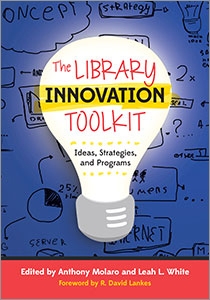Primary tabs
You don't need to be an ALA Member to purchase from the ALA Store, but you'll be asked to create an online account/profile during checkout to proceed. This Web Account is for both Members and non-Members. Note that your ALA Member discount will be applied at the final step of the checkout process.
If you are Tax-Exempt, please verify that your account is currently set up as exempt before placing your order, as our new fulfillment center will need current documentation. Learn how to verify here.
- Description
- Table of Contents
- About the authors
- Reviews
Progress for the sake of progress is all too often a drain on precious time and resources. The communities and users that libraries serve are always changing; true innovation helps libraries adapt to meet their needs and aspirations both now and in the future. This stimulating collection offers numerous snapshots of innovation in action at a range of libraries, showcasing ideas and initiatives that will inspire librarians at their own institutions. Among the topics covered are
- The importance of creating organizational structures that lead to innovation
- Strategies for getting library staff and other stakeholders on board and engaged, complete with a step-by-step toolkit for achieving innovative outcomes
- Ways to expand the library beyond its walls to deliver exceptional and innovative services to library users
- Money-saving initiatives that use technology to improve users' experience
- Innovative uses of library spaces, such as designing and implementing a digital media lab
- Examples of creative programming, from running a C2E2-style comic convention, creating an "idea" forum, to re-envisioning a children's writing club and launching Readtember, a month of literacy programs featuring zombies, dads, and gaming
This valuable sourcebook encourages readers to take big risks, ask deeper questions, strive for better service, and dream bigger ideas.
Foreword, by R. David LankesAcknowledgmentsIntroduction, by Anthony Molaro and Leah L. White Part I Innovative Culture 1 Zen and the Art of Innovation, by Sarah Hashemi Scott and Heather McNamee2 Driving Creativity and Innovation in Your Organization: It's Easier Than You Think, by Kelly Pepo3 The Library's Role in Promoting Tolerance and Diversity in a University, by Lorna E. Rourke Part II Innovative Staff 4 Innovation Wizardry, by Sarah Strahl and Erica J. Christianson5 Innovation Boot Camp: A Social Experiment, by Robin Bergart and M. J. D'Elia6 Building a Toolkit to Craft Your Instruction Program: The Virginia Tech Experience, by Tracy M. Hall, Edward F. Lener, and Purdom Lindblad Part III Innovative Outreach 7 Get On Board with Community Needs: Ferry Tales, a Monthly Book Group aboard a Ferry, by Audrey Barbakoff8 A Librarian Walks into a Bar, by Ben Haines and Kate Niehoff Part IV Innovative Technology 9 Seizing the Opportunity for Innovation and Service Improvement, by Cheryl McGrath and Brad Warren10 The "Eyes" Have It: A Digital Media Lab in an Academic Library, by Pat Duck Part V Innovative Spaces 11 Participatory Spaces and Idea Box, by Monica Harris12 "Like a Kid in a Candy Store": Marketplaces in Public Libraries, by Daisy Porter-Reynolds Part VI Innovative Programs 13 Apprentices of the Book Empire at a Glance, by Amy Holcomb and Anna Fillmore14 Monsters, Rockets, and Baby Racers: Stepping into the Story with Children and Young People, by Matt Finch and Tracie Mauro15 Librari-Con: Bringing Magic to Your Library, by Erika Earp and Melissa Lang16 The Business of Ideas: Using a TED-Like Event to Spread Innovation, by Troy A. Swanson About the Editors and ContributorsIndex
Anthony Molaro
Dr. Anthony Molaro is Assistant Professor in the MLIS Program at St. Catherine University in St. Paul, Minnesota. He is currently researching makerspaces and learning labs in public libraries. His other research and teaching focus is on public services, management, and leadership. He has written and presented on a variety of library topics. He blogs at The Information Activist Librarian and you can follow him on Twitter @infoactivist.
Leah L. White
Leah L. White is Head of Popular Materials at the Ela Area Public Library District in Lake Zurich, Illinois, and a member of the Adult Reading Round Table Steering Committee. She won the Library Journal Movers and Shakers Award in 2012. She enjoys reading comic books, Instagramming pictures of her pets, and spending too much time (and money) in independent bookstores. You can find her on Twitter @leahlibrarian or check out her website.
R. David Lankes
"For libraries and librarians looking for ideas off the beaten track, this book will provide some excellent ones. Recommended for public and academic librarians."
— Catholic Library World
"It is refreshing to read a book about innovation that stresses the importance of diversity and team work. The authors discuss creating an environment that fosters innovation where everyone feels they can contribute and have value. This book will get you thinking about your entire library team as potential innovators."
— Against the Grain
"Full of the essentials for innovation: bright ideas and strong will. It allows readers a chance to look at the experiments of others and encourages library professionals to try them at home … There is truly something to be gained from The Library Innovation Toolkit by any library department or employee as long as one has an open mind."
— Journal of Library Innovation
"This book should be included in any professional literature collections for libraries looking to innovate. But above all other audiences, this book is for those in libraries looking to be inspired and to do something new. As R. David Lankes says in his introduction, '[t]his book is one side of a conversation; add the other side. Link these ideas into your practice, but also deeper concepts and theories. Use these ideas, these points, these work plans as a foundation for a larger personal network of innovation. If readers of this book take on Lankes' challenge, the field will be better for it."
— Technical Services Quarterly



